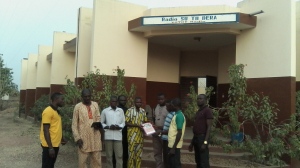by Dayo Emmanuel

Chief News Editor of the Republic of Benin-based radio station, Radio Su Tii Dera, Mr. Wahab Turari, has advised on the need for a working relationship between Nigerian journalists and their Benenoir counterparts.
Turari, who played host to journalists and missionaries from Nigeria recently, gave a background of the station based in Nikki, northern part of the West African nation.
“We are happy to have you pay a courtesy visit today. This is Radio Su Tii Dera, operating in Nikki. Journalist in Nigeria and Benin are the same, we are in the same profession and it is good if we have a good working relationship,” he said.
The News Editor continued that, “We have many radio stations in Benin Republic, some are business oriented, some are Christian oriented. We have different types. Radio Su Tii Dera is a community based radio station, we broadcast news of Benin Republic, it is owned by the country and sponsored by the people. So it is established for the country and not for individuals or of private interest.”
According to Turari, the station also has established partnership with professional bodies who sponsor programs. “We have arrangement with professional bodies who sponsor us, preachers do come here to preach as well and pay for their time used,” he explained.
Talking about the law that established the station, Turari said the law establishing the radio station made provision for it to be sponsored by the people, but later, such sponsorship had dwindled with time.
On the challenges facing the station, he said, “After commencing operations, the station originally designed to be sponsored by the people, has no enough sponsorship. We run the power generating set from personal fund, as you can see, there was no power supply when you came and we were not on air, but we had to start the generator by 5pm to commence operations again.”
He therefore welcome a collaboration that could yield results. “We would speak to our superior officers on a possible collaboration with you. It is good to network, you can bring a letter so we can submit to our bosses, it is not a strange thing to us,” he said.
In his response, Administrative Secretary of Journalists For Christ (JFC), Nigeria, Dayo Emmanuel, appreciated Turari for the warm welcome.
Emmanuel, who also writes for Newswatch Times newspaper in Nigeria, said, “Journalism is the same everywhere and more so, Benin Republic and Nigeria share common boarder as good neighbours on the West African coast and therefore should collaborate to achieve greater results.
He also told Turari about the Nigerian media. “Like you may have known, Nigeria operates a robust media industry. Apart from being the most populous nation on the continent, Nigeria is also home to outstanding media organisations and media professionals who have distinguished themselves globally. Therefore a collaboration would no doubt facilitate rapid career development, which would definitely reflect on our societies.”
Also on the team, Ayokunle Samuel Oloye, a JFC member who also writes for the Peoples Daily newspaper in Nigeria, appreciated Radio Su Tii Dera for opening its doors to their Nigerian counterparts.
“I particularly thank you all for giving us the opportunity to know more about what you do here. Like you mentioned, a synergy between Nigerian journalists and your station would go a long way to strengthen the relationship between our two nations,” he said.
Emmanuel also intimated Turari on JFC, Nigeria. “Journalists For Christ is an organisation for Christian journalists and allied professionals in Nigeria. We have members from various media houses and since 1998, we meet for fellowship every third Saturday of the month to share the word of God, pray and engage in career development workshops.”
He added that, “Our recent project was a month-long media monitoring on portraying and reportage of women and girls right issues in six Nigerian newspapers, which report was published and presented to the public in January.” He continued that, “Theme of the publication sponsored by World Association for Christian Communication (WACC), Canada, is ‘Mainstreaming Gender Reporting on Affirmative Action of Women and Girls Rights Issues,’ advising that, “This is a kind of synergy we feel journalists across the African sub-region and even across the world should form to better the lot of the people.”
JFC however called on Radio Su Tii Dera to give more prominence to reporting women and girls right issues in their bulletins.
At the end of the courtesy visit, Turari, who introduced other staff of the station on duty, also conducted the visitors round the facility after which a copy of the JFC/WACC publication was formally presented to the station.
Also on the visit were Nigerian and Benenoir missionaries, including, Pastors Olusina Sadiku, Akin Ajiboye, Timothy Ajiboye, Femi Dada, Andrae Salifu, George among others.
 As Cannes Lions International Festival of Creativity launches its communications campaign for 2016 titled ‘Thank You Creativity,’ the official festival representative in Nigeria, CHINI Productions, has also rolled out plans for the pre-Cannes local events in Nigeria. Activities lined up in Nigeria include the Roger Hatchuel Academy, the Young Lions Competitions, the Miami Ad School Scholarship Competitions, Lions Edit and Lions Night & Awards.
As Cannes Lions International Festival of Creativity launches its communications campaign for 2016 titled ‘Thank You Creativity,’ the official festival representative in Nigeria, CHINI Productions, has also rolled out plans for the pre-Cannes local events in Nigeria. Activities lined up in Nigeria include the Roger Hatchuel Academy, the Young Lions Competitions, the Miami Ad School Scholarship Competitions, Lions Edit and Lions Night & Awards.






